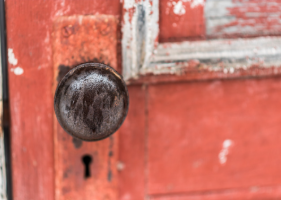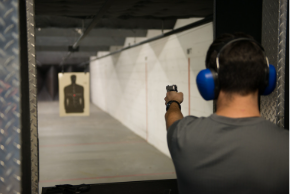Information for parents and caregivers

Lead is a type of metal found naturally in all parts of our environment. This metal has been used in gasoline, paint, cosmetics, glazes, ammunition, and pipes. Although lead has beneficial uses, it can be toxic if swallowed or inhaled. Lead has been banned from many products, however it can still be found throughout our environment.
Lead exposure
Lead exposure in children is associated with serious health effects, including developmental delays, learning difficulties, and behavioral issues. Children under age 3 are at higher risk because they spend most of their time on the floor or ground, breathing in or swallowing more dirt and dust than adults. When children swallow dirt that contains lead, it enters their blood and can affect their rapid growth and development.
Children living in older homes or in areas with environmental lead exposure are also at high risk. Medicaid, CHP+, and most private insurance cover the costs of blood lead testing for children under age 6. Because symptoms often are not apparent, a blood lead test is the best way to know if a child has been exposed to lead.
For information about next steps after your child has been tested for lead, visit Learning about lead.

Lead in paint
Lead-based paint in homes built before 1978
Lead was added to paint to speed up drying time, create bright colors, and make it resistant to moisture. The use of lead-based paint in homes was banned in 1978. If you live in a home built before 1978, you may want to get your home tested for lead, as chipping paint and dust are the most common cause of lead poisoning. Visit the link above to learn more about lead-based paint and how to prevent exposure.

Lead in water pipes
Water in pipes from homes built before 1986
Lead service lines were common in the U.S. until the Safe Drinking Water Act of 1974 intended to protect the quality of drinking water and ultimately banned the use of lead in pipes, solder, and other plumbing materials in 1986. However, lead pipes installed before this year still exist. Lead in drinking water typically occurs because these lead-containing pipes and plumbing materials corrode over time. Visit the link above to learn more about what to look out for in pipes, as well as how to request testing and reduce your exposure to lead in drinking water.

Lead in soil
Lead-containing soil or dust that is tracked into the home
The soil you come into contact with every day may contain heavy metals, such as lead, arsenic, and mercury, that can get into your body by accidentally eating or breathing in dirt and dust particles. Luckily, you can take simple actions to protect yourself and your family. Visit the link above to learn more about preventing lead exposure from soil around your home and community.

Lead in aviation gas
Lead in air and soil from aviation gas
Children who live near airports may be exposed to lead in air and soil from aviation gas used in piston-engine aircraft. Leaded aviation gas is just one potential source of lead exposure. Visit the link above to learn more about sources of lead exposure and how to prevent exposure.

Lead in game meat
Lead bullet fragments in ground game meat
Eating game meat harvested with lead bullets increases the risk of lead poisoning. Lead bullets easily fragment when they strike an animal, and people can eat them in processed game meat. These fragmented pieces are often too small to see or feel while eating. Visit the link above to learn more about lead in game meat and how to prevent exposure.

Lead in construction, mining, welding, mechanic, or plumbing industries
Working with lead or lead-based products
Lead exposure at work is common in construction, mining, and manufacturing industries. You could be at risk for lead poisoning if you work around products or materials that contain lead. Lead poisoning can be prevented by following rules and safety measures at the workplace. Visit the link above to learn more about lead in the workplace and how you can protect yourself.

Lead in indoor shooting ranges
Lead bullets at shooting ranges
Shooters and range employees are exposed to lead when lead dust is released from a fired gun. Lead dust can settle on clothes and be brought home. Understanding how lead exposure can happen at the range and how to protect yourself and your family is important. Visit the link above to learn more about lead at shooting ranges and how you can protect yourself.

Lead and pregnancy
Passing lead to your baby while pregnant or breastfeeding
If you have lead in your body, it can pass it to your unborn child during pregnancy or while breastfeeding. Lead can cause your baby to be born too early or too small and can harm developing brains, nervous systems, kidneys, and other organs. Visit the link above to learn more about the steps you can take to keep you and your baby safe from lead exposure.
Reducing lead exposure
There are many ways to reduce a child’s exposure to lead. To protect your family:

Get your cleaning on
Lower the risk of lead exposure by learning effective cleaning methods and housekeeping tips.

Get your child tested
Choosing to get your child tested for lead is an important way to ensure your child stays healthy and develops appropriately. Lead testing for children may look different depending on where you live and what tests are available at the time of testing. Contact your child’s healthcare provider to find out how to schedule a lead test.

Get your home tested
Hire a certified professional or risk assessor to check your home for lead-based paint or lead hazards to minimize your risk of exposure.
Lead recalls
A list of recalled items can be found at the Consumer Product Safety Commission (CPSC) recall website or the Food and Drug Administration (FDA) recall website.
- June 26, 2025: Boyro Baby Walkers
- July 10, 2025: SPPTTY Kids 14- and 18-inch Bicycles
- July 23, 2025: Parashore Pear Slices in Juice, 15 oz
- September 16, 2025: Sprout Organics Sweet Potato Apple and Spinach, 3.5 oz Pouch, LOT 4212, 4213, 4282, 4310
- September 26, 2025: Wise Wife Ground Cinnamon
- October 2, 2025: Evermore Surprise Eggs
- October 6, 2025: Durra Ground Cinnamon 3.5 oz
- October 17, 2025: Haetae Ground Cinnamon 8 oz
- November 19, 2025: Majestic Chef Milk Pan 24cm
- December 9, 2025: Lucky Foods Cinnamon Powder 40g
- December 12, 2025: Town Food Service Equipment Co., 1-3 Quart Saucepans
- December 22, 2025: Virgo Rheumacare Capsules, LOT CAM040 & CALO79-N
- January 8, 2026: Klong Kone Shrimp Paste
- January 23, 2026: IKM Cookware Items
Contact
For questions about lead poisoning: ToxCall, (303) 692-2606 or cdphe_toxcall@state.co.us
For lead testing, reporting questions, and requests for fact sheets in other languages: cdphe_leadreports@state.co.us